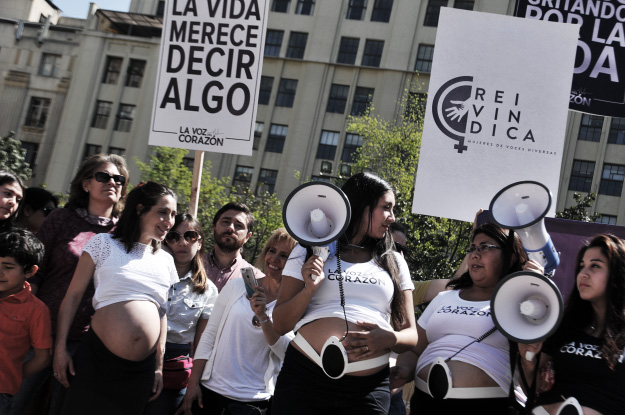On October 2, the amplified thump-thump-thump of babies’ heartbeats echoed in front of Chile’s La Moneda Palace. A dozen pregnant women, loudspeakers attached to their protruding bellies, stood with some 100 supporters to protest pending legislation that would liberalize the country’s harshly restrictive abortion laws. Calling their campaign “La Voz del Corazón,” or “The Heart’s Voice,” the demonstration was just one example of pushback against efforts to expand abortion access in a country that is otherwise a beacon of progressive rights in the region.
Recently ranked as Latin America’s third-most inclusive country in AQ’s annual Social Inclusion Index, Chile recognizes same-sex civil unions, has some of the region’s strongest protections for political and civil rights, and counts a woman, Michelle Bachelet, as its president. But the country is behind the curve on abortion rights, among the likes of El Salvador, Nicaragua and the Dominican Republic as places where women can face jail time for having an abortion for any reason.
Bachelet is now trying to change that by overturning existing law and pushing for the passage of the so-called Three Grounds proposal, which would allow for abortion up to 12 weeks in cases of rape, when a mother’s life is in danger, or when a fetus is not expected to survive pregnancy. But the legislative push is part of an uphill battle that long predates Bachelet’s government.
There have been a total of 28 motions to overturn the criminalization of abortion in the past 28 years of Chile’s democracy, including a failed attempt to pass abortion legislation in 2010, according to Claudia Dides, director of Corporación Miles, an NGO dedicated to promotion of reproductive and sexual rights in Chile. After 60 years of law that allowed for therapeutic abortion, or abortion when a mother’s physical or mental health is at risk, an outright ban was put into place in 1989 during the dictatorship of Augusto Pinochet. Subsequent governments have either been unable or unwilling to overturn the ban. That includes the adminsitration of former President Sebastian Piñera, who recently lauded an 11-year-old pregnant rape victim after she gave a TV interview saying she would happily have the baby. Piñera is thought to be considering a run for president again in 2018.
But the tide may now be shifting. During her first term as president from 2006 to 2010, Bachelet did not push for the abortion proposal, but did pass legislation allowing for free emergency contraception to women and girls over the age of 14. In an interview with the BBC in late September, Bachelet said she thought there now was enough public support to help get abortion rights legislation passed. Bachelet, whose approval rating is on the upswing after an all-time low, has been at the helm of the current legislative push since 2015. Since the Three Grounds proposal was signed in early 2015, the bill has been approved by Chile’s Health Commission and the House of Representatives, and is now waiting on a vote in the Senate; it could be passed as early as January 2017.
“If abortion passes in Chile on the Three Grounds proposal it will be a victory,” Catalina Martínez Coral, regional director for Latin America and the Caribbean at the Center for Reproductive Rights told AQ. “Feminists want more, of course, we want the full right to decide what happens to our body, but the reality is that we are in a very difficult region where religion and conservatism reign.”
With public opinion divided on the issue, advocates on both sides are speaking out. Mujeres Reivindica, the pro-life and self-proclaimed feminist movement that organized the October 2 protest, notes what it calls misinformation disseminated by the Bachelet administration, as well as a lack of policies in place to protect victims of sexual offenses. Rosario Vidal, the president of the group, said that more should be done to provide comprehensive health care to victims of sexual violence, who are often at increased risk of suicide.
“The legalization of abortion doesn’t offer a solution… abortion is not a right, it’s a public policy,” Vidal told AQ.
Many international organizations take a different stance. Both the United Nations and the Inter-American Commission on Human Rights have declared access to abortion a human right and recognize the negative impact of abortion prosecution on women’s rights. In Chile, for example, an estimated 200,000 unsafe abortions continue to be performed each year.
“Women are dying in Latin America because they can’t find adequate reproductive care in hospitals and they are turning to illegal and unsafe abortion that puts their lives and health at risk,” Martínez Coral told AQ.
To be sure, Chile is not the only country where divided public opinion over abortion law is coming to a head. In Latin America, El Salvador’s Farabundo Martí National Liberation Front (FMLN) is pushing for abortion legalization in the case of rape, while women in Honduras are asking congress to decriminalize abortion. Elsewhere, conservative movements proposing to ban abortion rights are creating tensions in places like Russia and Poland.
While Bachelet expressed confidence that Chile’s Three Grounds proposal would pass, some are asking whether it will be enough. “We have to take it step-by-step. Once the legalization is in place, we can then begin the battle for a broader interpretation of the law,” said Martínez Coral.
—
Bintrim is an editor for AQ







